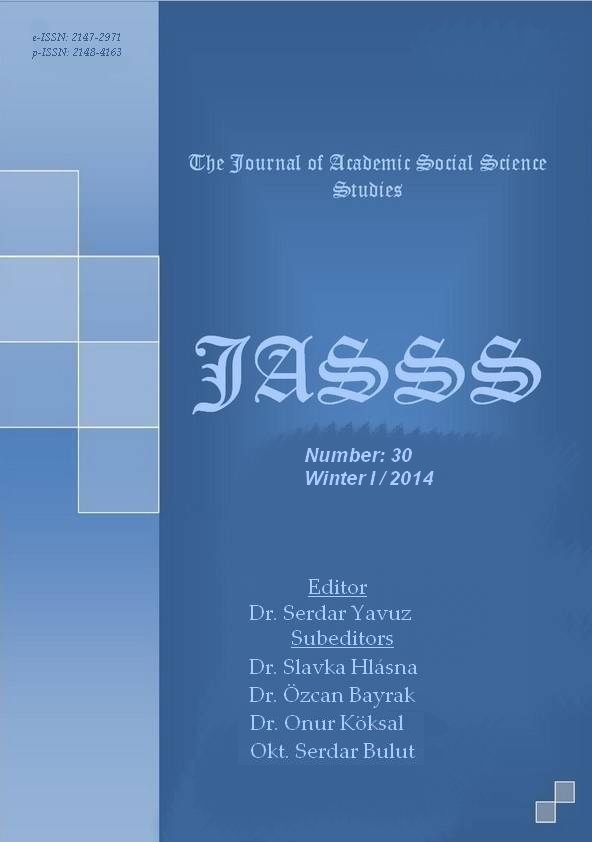TÜRK AİLE YAPISININ DEĞİŞİM VE DÖNÜŞÜMÜ VE BU DEĞİŞİM VE DÖNÜŞÜME ETKİ EDEN UNSURLARIN DEĞERLENDİRİLMESİ
Author :
Abstract
Birbirlerine doğrudan akrabalık bağıyla bağlı olan, yetişkin üyelerin çocuklara bakma rolünde olduğu bir insan topluluğu olarak tanımlanabilen aile, toplumun en küçük yapı taşıdır. Aile, biyolojik, psikolojik, ekonomik, toplumsal, hukuksal ve benzeri yönleri bulunan toplumsal bir birimdir. Bunun yanında, aile geçmişten günümüze toplumda oluşturulmuş maddi ve manevi değerleri kuşaktan kuşağa aktarır. Aile, ülkelerde ve dünyada meydana gelen değişim ve dönüşümlerin etki ve sonuçlarının en belirgin olarak izlendiği toplumsal kurumların başında gelmektedir. Bu gerçekten yola çıkılarak Türk aile yapısının değişim ve dönüşümü ve bu değişim ve dönüşüme etki eden unsurların değerlendirilmesi amacıyla bu araştırma yapılmıştır. Araştırmada nitel araştırma yöntemlerinden doküman incelemesi yöntemi kullanılmıştır. Araştırma için konuyla ilgili kaynaklara ve verilere ulaşılarak alan yazın taraması yapılmıştır. Araştırma ile ilgili kitap, tez ve raporlar incelenmiş elde edilen veriler sistematik bir biçimde bütünleştirilmeye çalışılmıştır. Bulgular arasında ilişkilendirme yapılarak, yargılar oluşturularak, değerlendirmeler yapılmıştır. Araştırmada Türk aile yapısının değişim ve dönüşümüne etki eden başlıca unsurların göç, yoksulluk, toplumsal değerler, teknoloji ve kadınların çalışma hayatına girmesi olduğu sonucuna ulaşılmış ve bu unsurlar açıklanmıştır. Tüm değişim ve dönüşümlere rağmen sonuç olarak görülmektedir ki; Türk toplumu hem çağdaş hem de geleneksel özelliklerini aile yapısında korumaya devam etmektedir. Dayanışma, yardımlaşma, evlilik sistemi ve kadının annelik rolünün önemi bu özellikler arasında sayılabilir.
Keywords
Abstract
Family that can be described as a group of people that are directly connected with the bond of kinship and that adult members has a role of looking at the children is the smallest building block of society. Family is a social unit that has biological, psychological, economic and legal aspects. Besides, the family transfers material and moral values that were created in society from generation to generation. The impact and the results of changes and transformations occurring in the countries and the world can be observed at the family, obviously. In this research, explaining change and transformation of Turkish family structure and evaluating the elements that affecting this change and transformation were aimed. Document review method that is one of the qualitative research methods was used at the research. Field survey was carried out by searching relevant resources and data. Books, thesis, and reports related with the research were surveyed and the data obtained were integrated sistematically. Evaluation was made by associating findings and by creating judgements. At the end of the research it was found that the leading elements affecting change and transformation of Turkish family structure were migration, poverty, social values, technology and working of the women and this elements were explained. Despite all the change and transformation, as a result, it is seen that Turkish society continues to protect both contemporary and traditional properties by its family structure. Solidarity, cooperation, marriage system and the importance of the role of the women’s motherhood are among these properties.





